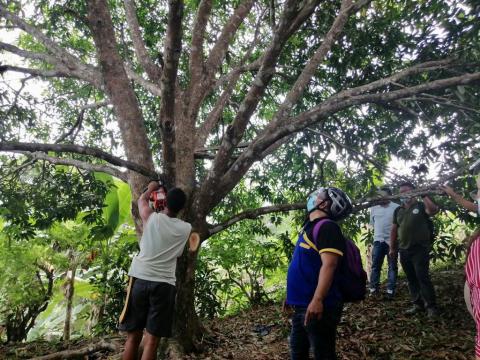Participants who are gathered in a mango plantation conduct prunning activity during field demonstration
Central Visayas – Mango is the third most important fruit crop in the Philippines next to banana and pineapple. It has been said that mango, the country’s national fruit, is considered as one of the finest fruits in the world. The country has a Philippine Carabao Mango variety which is said to be one of the best mango varieties in the world. Mango has an established domestic market and has promising opportunities for the international market.
To regain position in innovation on production technology, post-harvest, product development, and export marketing in order to supply consistently safe and high-quality products is the vision of the 2017-2022 Philippine Mango Industry Roadmap. Different initiatives have been done to achieve this mission, including capacity building activities to extension workers and mango farmers.
On June 23-25, 2021 a region wide blended Training of Trainers on Mango Rehabilitation: Orchard Restoration was organized. It was participated by 28 participants from Bohol, Cebu and Negros Oriental. The training was attended by HVCDP focals and mango farmers.
21 participants from Bohol attended the training in Hotel 850, Ipil, Jagna, Bohol. While participants from Cebu and Negros Oriental joined the training online, through Google Meet platform. Five of the participants in Bohol are members of the Jagna Mango Growers Association who are currently enrolled in the farmer field school for mango production.
The training enabled the participants to learn about the situation of Philippine mango industry. In the course of the training, participants were able to learn crop management in the rejuvenation of old and unproductive mango trees, techniques of mango rehabilitation, cost and return of investment of mango production, and code of good agricultural practices for mango.
John Dennis Ranario from DA Regional Field Office 7, Henry Binahon from Binahon Agroforestry Farm in Bukidnon, and Mary Queen Atup from Office of the Provincial Agriculture of Bohol shared their expertise on the topics discussed as resource persons. Maryjane Flor Patulilic, and Julie Buhion of ATI RTC 7 served as members of the training management team.
"From this training, I have learned different mango production technologies such as flower induction and fruit management. I am going to apply all of these learnings in my mango farming management,” said Celso Nayga – a member of the Jagna Mango Growers Association and a training participant.
Should there be any clarifications or inquiries around this training, you may contact Joemelyn Sumagang, Project Officer, through her email at prettieblack8910@gmail.com.

